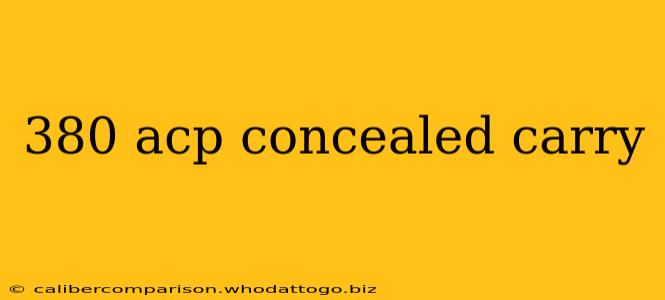The .380 ACP (Automatic Colt Pistol) cartridge has become a popular choice for concealed carry, particularly among those seeking a smaller, lighter firearm. Its manageable recoil and relatively compact size make it attractive to both novice and experienced gun owners. However, choosing the right firearm and understanding its limitations are crucial for safe and effective concealed carry. This guide provides a comprehensive overview of the .380 ACP for concealed carry, addressing its advantages, disadvantages, and critical considerations for responsible gun ownership.
Advantages of .380 ACP for Concealed Carry
- Compact Size and Lightweight: .380 ACP pistols are generally smaller and lighter than their 9mm counterparts, making them easier to conceal and carry comfortably throughout the day. This is a significant advantage for individuals who prioritize discreet carry.
- Manageable Recoil: The lower recoil of the .380 ACP makes it a great option for smaller-framed individuals or those new to firearms. This reduced recoil translates to faster follow-up shots and improved accuracy.
- Ease of Use: Many .380 ACP pistols boast simple designs, making them user-friendly and easy to operate, even under stress.
- Availability and Affordability: A wide range of .380 ACP pistols are available on the market, offering various features and price points, catering to diverse budgets and preferences.
- Ammunition Availability: .380 ACP ammunition is widely available and relatively inexpensive compared to some other calibers.
Disadvantages of .380 ACP for Concealed Carry
- Stopping Power: The .380 ACP is generally considered to have less stopping power than larger calibers like 9mm or .45 ACP. This means that a greater number of well-placed shots may be required to stop a threat. Understanding shot placement is paramount.
- Penetration: The relatively low energy of the .380 ACP may result in limited penetration, especially through barriers like clothing or car windshields.
- Limited Magazine Capacity: .380 ACP pistols typically have smaller magazine capacities than larger caliber handguns, meaning fewer rounds available in a self-defense situation.
Choosing the Right .380 ACP for Concealed Carry
Selecting the right .380 ACP pistol depends on individual needs and preferences. Consider the following factors:
Ergonomics and Grip: The firearm should fit comfortably in your hand, allowing for a secure and consistent grip.
Reliability: Opt for a reputable manufacturer known for producing reliable firearms. Regular maintenance and cleaning are essential for optimal performance.
Accuracy: Accuracy is crucial in a self-defense situation. Choose a pistol that you can shoot accurately and consistently.
Safety Features: Look for pistols with features like manual safeties, or other safety mechanisms that you are comfortable with and understand.
Responsible Concealed Carry with .380 ACP
Regardless of caliber, responsible gun ownership involves comprehensive training, legal understanding, and a commitment to safe handling practices.
Training: Professional firearms training is essential. This includes proper handling, safety procedures, marksmanship, and situational awareness.
Legal Requirements: Familiarize yourself with all applicable laws and regulations regarding concealed carry permits, licensing, and restrictions in your area.
Self-Defense Strategy: Develop a comprehensive self-defense plan that goes beyond just carrying a firearm. This includes situational awareness, de-escalation techniques, and understanding the legal implications of using a firearm in self-defense.
Conclusion
The .380 ACP can be a suitable option for concealed carry, particularly for individuals who prioritize a smaller, lighter firearm. However, it's crucial to understand its limitations regarding stopping power and penetration. Responsible gun ownership requires thorough training, a deep understanding of relevant laws, and a commitment to safe handling practices. Choose your firearm carefully, practice regularly, and prioritize safety above all else. This information is for general knowledge and should not be considered professional advice. Always consult with qualified experts and legal professionals before making any decisions regarding firearms ownership and self-defense.

